City Council approves Rahm Emanuel's resolution on extended school day
Following months of carefully orchestrated attacks on the Chicago Teachers Union, the Chicago City Council at its September 8, 2011 meeting voted in favor of a resolution (which was not on the Council's public agenda) in favor of the "extended school day" according to the talking points that have been repeated by Mayor Rahm Emanuel for more than six months, both before and after he became mayor. Emanuel was inaugurated on May 16, 2011, but he began making claims, most of which have not been verified and some of which are simply untrue, as part of an orchestrated attack on the Chicago Teachers Union during the primary campaign as early as January 2011.
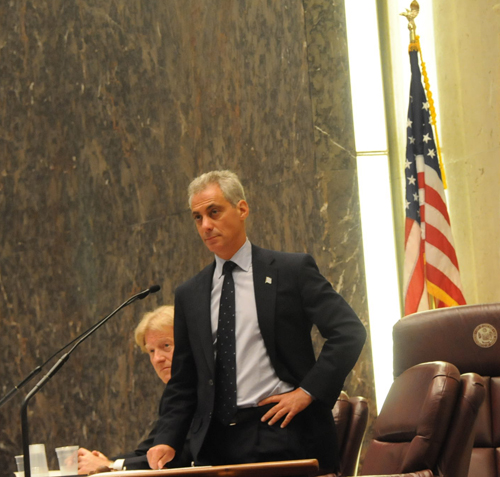 Chicago Mayor Rahm Emanuel presiding over the September 8, 2011 meeting of the Chicago City Council. The council approved a resolution calling on Chicago Public Schools to increase the length of the school day. Substance photo by George Schmidt.The actual resolution voted on by the City Council on September 8 was introduced not by the mayor, but by Alderman Latasha Thomas, chair of the City Council Education Committee. Following a moving series of remarks about the anniversary of September 11, 2001, and the reading of the business that was coming before the council, Alderman Thomas took the floor for a special order of business and read the following resolution:
Chicago Mayor Rahm Emanuel presiding over the September 8, 2011 meeting of the Chicago City Council. The council approved a resolution calling on Chicago Public Schools to increase the length of the school day. Substance photo by George Schmidt.The actual resolution voted on by the City Council on September 8 was introduced not by the mayor, but by Alderman Latasha Thomas, chair of the City Council Education Committee. Following a moving series of remarks about the anniversary of September 11, 2001, and the reading of the business that was coming before the council, Alderman Thomas took the floor for a special order of business and read the following resolution:
RESOLUTION:
WHEREAS, Recent studies have shown that students who are enrolled in the Chicago Public Schools system receive the least amount of instructional time among students in the Country's ten largest cities; and
WHEREAS, Currently Chicago Public Schools provide students with fifteen percent less instructional time than the national average; and
WHEREAS, From kindergarten through high school, a Chicago Public School student receives nearly three fewer years of instructional time than a peer in Houston; and
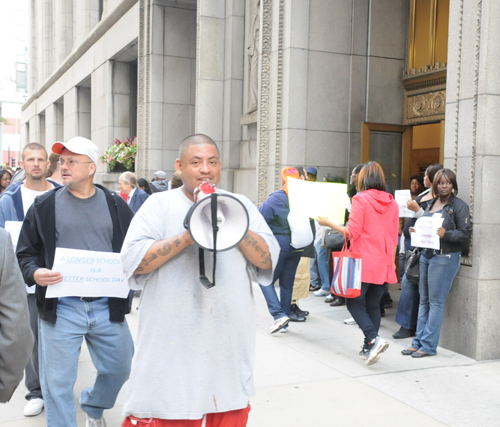 Chants for a longer school day echoed outside Chicago's City Hall as a group of people bussed in for the morning marched below the mayor's office window carrying signs in favor of the longer school day. Above, some of those in the march, which at its height numbered 200 people. Substance photo by George N. Schmidt.WHEREAS, According to academic studies and educational experts, additional instructional time is a key factor in student success. Student success has been observed in high-achieving schools with extended instructional time in Chicago and across the nation; and
Chants for a longer school day echoed outside Chicago's City Hall as a group of people bussed in for the morning marched below the mayor's office window carrying signs in favor of the longer school day. Above, some of those in the march, which at its height numbered 200 people. Substance photo by George N. Schmidt.WHEREAS, According to academic studies and educational experts, additional instructional time is a key factor in student success. Student success has been observed in high-achieving schools with extended instructional time in Chicago and across the nation; and
WHEREAS, At Chicago's Noble Street Charter Network, the school day is one hour and forty-five minutes longer than at a typical Chicago public school. Among CPS open-enrollment schools, Noble schools ranked Number One and Number Two in 2010 student ACT scores; and
WHEREAS, Urban Prep Academy seniors have spent 72,000 more minutes in the classroom than their peers in traditional Chicago public schools. Every student in Urban Prep's first and second graduating classes has gained admission to a four-year college; and WHEREAS, Extending the daily instructional time for students will re-purpose the school day, allowing more time for core academic subjects, particularly math, science, and social students; and
WHEREAS, An extended school day would also broaden students' enrichment opportunities, such as physical education, art and music classes, and library time. It would give student adequate time for a mid-day lunch, and a recess period so they can exercise and refocus themselves. In addition, schools will have more time to provide assistance to students through the use of support services; and
WHEREAS,, Surveys of Illinois teachers found that 69% strongly or somewhat strongly disagree that they have sufficient instructional time to meet the needs of their students. An extended school day will provide adequate time for teacher planning and collaboration; and
WHEREAS, In an overwhelming show of support for the clear benefits of a longer school day, almost 300 leaders of various faiths throughout Chicago signed a petition showing their support for an extended school day for our children; and
WHEREAS, Our children in the Chicago Public School system deserve a bright future. The City of Chicago would benefit greatly by graduating students who can make our City grow and prosper. Our children's future is also our City's future. With a well-educated workforce to draw from, companies will be more willing to locate in Chicago; now therefore,
BE IT RESOLVED, That we, the Mayor and Members of the City Council of the City of Chicago, assembled this eighth day of September 2011, do hereby express our desire that the school day in the Chicago Public School system be increased as soon as possible; and BE IT FURTHER RESOLVED, That suitable copies of this resolution be presented to Jean-Claude Brizard, the Chief Executive Officer of the Chicago Public School sysstem and to David Vitale, the President of the Chicago Public School Board.
//SUBMITTED. Alderman Latasha Thomas, 17th Ward
The resolution was not on the public agenda for the meeting, although some aldermen had been alerted that it would be submitted. Others told Substance that they didn't know it was coming until Alderman Thomas read it to the Council. Although Emanuel's supporters had been stating that the school year should be extended by 90 minutes per day and two weeks per year, nothing in the resolution specific that amount. Demonstrators who had picketed outside the Chicago Board of Education meeting on August 24 appeared again under the City Hall walls on September 8. Some were carrying signs that called for 90 minutes more and an additional two weeks, but most were carrying signs that simply demanded a longer school day. A number of those questioned by Substance told Substance that while they did not have children in Chicago's public schools they supported the mayor's efforts to create a longer school day in Chicago for the sake of "the children."
The City Council meeting began with an hour of solemn speeches about the anniversary of September 11, 2001, with no mention that the schools resolution was to come. More than a dozen aldermen spoke of their experiences on September 11, 2001, and the City Council then passed a resolution on the topic. The September 11 resolution was then followed by the readings of all the ordinances and other business coming before the Council, most of it from the mayor. Then Alderman Latasha Thomas took the floor and asked to introduce a special order of business. After reading the proposed resolution on the length of the school day, she yielded the floor more than two dozen of her City Council colleagues, all of whom spoke in favor of the resolution.
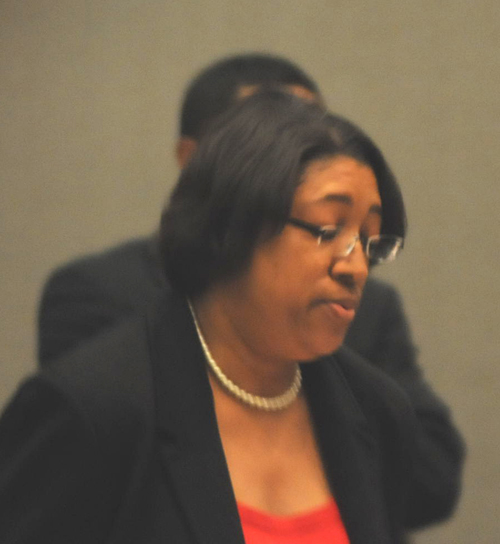 Instead of bringing the matter before the Education Committee, which she chairs, Alderman Latasha Thomas (above, reading the resolution) asked for a Special Order of Business to consider the resolution. Questions have been raised about whether her maneuver violated the Illinois Open Meetings Act, since the resolution did not appear on the public agenda for the meeting. Substance photo by George N. Schmidt.A few minutes before Alderman Thomas's resolution, mayoral press aides distributed a press release to members of the press in the press section of the City Council. The press release was headlined: 'Mayor Rahm Emanuel, Chicago Public Schools CEO Jean-Claude Brizard and Chicago Public Schools Board President David Vitale Applaud Teachers at Benjamin E. Mays Elementary in Englewood for Voting Today to Lengthen Their School Day."
Instead of bringing the matter before the Education Committee, which she chairs, Alderman Latasha Thomas (above, reading the resolution) asked for a Special Order of Business to consider the resolution. Questions have been raised about whether her maneuver violated the Illinois Open Meetings Act, since the resolution did not appear on the public agenda for the meeting. Substance photo by George N. Schmidt.A few minutes before Alderman Thomas's resolution, mayoral press aides distributed a press release to members of the press in the press section of the City Council. The press release was headlined: 'Mayor Rahm Emanuel, Chicago Public Schools CEO Jean-Claude Brizard and Chicago Public Schools Board President David Vitale Applaud Teachers at Benjamin E. Mays Elementary in Englewood for Voting Today to Lengthen Their School Day."
Then the aldermen were called on, one by one, to praise the resolution and call for the longer school day.
The first to speak was Alderman Rey Colon (35), who said that his children had attended public schools and that his daughter had graduated from Whitney Young Magnet High School and done well. He didn't explain, and wasn't asked, whether Whitney Young had a longer school days during those years. (The entire discussion has, of course, left out the city's high schools, which already have a regular school day since they do not have Closed Campus).
Following Colon was Alderman Carrie Austin (34). She reminded the Council that she had seven children of her own and 29 grandchildren, and that they had all been doing well. She seems to be saying that they would have done even better with the longer school day, but she wrapped up by saying, "They need to be there until four or five o'clock."
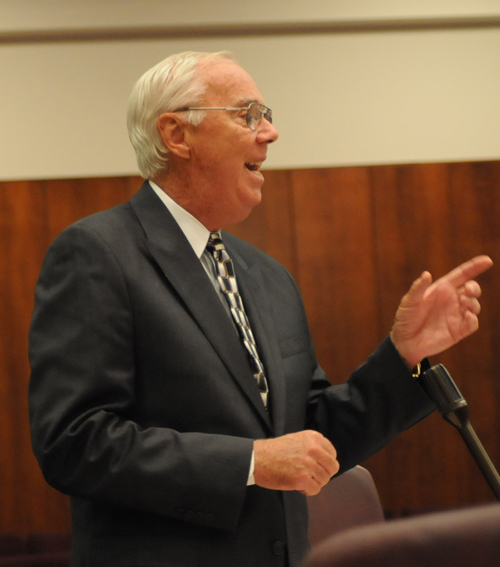 The first alderman who directly attacked the Chicago Teachers Union was Richard Mell (33), who has ignored the problems of the public schools in his northwest side ward while allowing the slow incursion of charter schools (which have raided the ward's real public schools). Substance photo by George N. Schmidt.The first speaker to attack the Chicago Teachers Union directly was Richard Mell (33). Mell told a long story about is own childhood, about how the jobs that were once there for kids who dropped out of school in the old days were no longer going to be there, and how that meant that every kid had to be kept in school longer. He then said: "The people who are fighting you Mr. President are not in the best interest of our children."
The first alderman who directly attacked the Chicago Teachers Union was Richard Mell (33), who has ignored the problems of the public schools in his northwest side ward while allowing the slow incursion of charter schools (which have raided the ward's real public schools). Substance photo by George N. Schmidt.The first speaker to attack the Chicago Teachers Union directly was Richard Mell (33). Mell told a long story about is own childhood, about how the jobs that were once there for kids who dropped out of school in the old days were no longer going to be there, and how that meant that every kid had to be kept in school longer. He then said: "The people who are fighting you Mr. President are not in the best interest of our children."
Alderman Thomas Tunney (44) took a different approach, slandering the general high school in his community (Lakeview) while talking about taxes and how much he cares about the public schools. According to Tunney, the wealthy residents of the 44th Ward will not think of sending their children to Lakeview High School because the average ACT scores at Lakeview are 17 and everyone knows that indicates that Lakeview is a terrible school. "The parents in my ward would never send their children to a school with an average ACT score of 17," Tunney proclaimed, implying that the longer school day will raise Lakeview's ACT scores, even though the longer school day being proposed by Rahm Emanuel doesn't apply to the city's high schools. Tunney claimed that Chicago would lose residents and be in decline if the Council didn't pass the resolution. "This resolution doesn't go far enough," Tunney concluded.
Alderman Willie Cochran (20) joined those who were attacking the Chicago Teachers Union by proclaiming that the resolution constituted a "defining moment" in Chicago history. Cochran said that he had been lobbying teachers and principals on behalf of the mayor's waiver proposal, and urged the other aldermen to do so as well. "Talk to your teachers and principals," Cochran told his fellow aldermen.
Alderman Harry Osterman (48) said that parents needed the longer school day, citing examples that came mostly from the child care concerns that arise when it is not provided. He told the Council, though, that the longer school day should not be implemented school by school but all at once.
Alderman Pat Dowell (3) said that she supported the longer school day and that the time was needed to "fill the learning gaps." She added that the expansion should be done "on a systematic basis."
Alderman Dowell was followed by Alderman Scott Waguespak (32), who spoke in favor of the resolution but spoke forcefully on behalf of the teachers. "Be sure the teachers are getting paid appropriately for their extra time," he said. He told the Council that we need to move forward "as one." Wqugespak's reminder that teachers deserve to be paid for extra time at work brought a warning sign later from Mayor Emanuel, who singled out three aldermen for implied threats.
Alderman Walter Burnett (27) noted that he had six Noble Street Charter Schools in his ward, and that Skinner North elementary (a gifted school) was also in his ward. He said that "a lot of good schools already do it [the longer day]" and urged the Council to vote for it. Burnett ended by stating that for the sake of working families the children should be kept in school until five o'clock.
Alderman Mary O'Connor (41) said she supported the resolution.
Alderman Jose Maldonado (26) told the Council that he had once worked for CPS, and supported the resolution. "I don't understand how anyone can be against this," he said.
Alderman Brendan Reilly (42) praised Mayor Emanuel for his "courage" in bringing the matter up. Reilly said that adult were "bickering" while the children suffered. "Every day that adults are bickering we are falling further behind," Reilly said, repeating the claim by Emanuel and in the resolution that Chicago school children get three years fewer than children in Houston. "I stand with you today," he proclaimed, looking toward the mayor.
Alderman Nick Spisoto (36) drew an angry look from the mayor when he reminded his fellow aldermen that "everyone should be on board." Sposato made it clear that he was supporting the unions.
Alderman Sandi Jackson (7) told the Council that the city should be looking at how to pay for extra curricular and other activities in addition to the longer elementary school day. She praised the teachers saying that every day the children in her ward were "engaged by hard working professionals who love what they do." One of the things Jackson mentioned was that in Europe, which she said she had visited many times, children were learning not just two languages, but often as many as four. She reminded the Council that competition in the "Global Economy" required that children be able to learn foreign languages in public schools.
The attack on the unions continued. "The unions are holding them [the children] back," proclaimed alderman George Cardenas (12). He said that the Council needed to force teachers to teach longer, citing the 90 minutes that are not in the resolution. Cardenas said that bankers and other successful people worked extra hours without demanding additional pay and that teachers should do the same. Cardenas added that he had many friends and family members who were teachers and that he had nothing but the greatest respect for teachers.
Alderman James Cappelman (46) reminded his colleagues that he had been a public school teacher and that there had to be funding for the schools. He said the city needed to support the teachers and make sure that every school had everything it needed. He noted that Stewart School in his ward did not have a library.
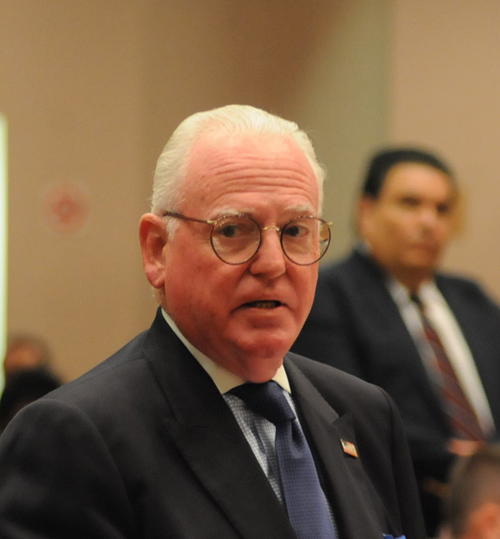 Alderman Edward Burke attacked the Chicago Teachers Union during his remarks about the longer school day, but didn't explain how he had tolerated the problem during the 16 years the schools were under the control of Mayor Richard M. Daley. Substance photo by George N. Schmidt.Alderman Edward Burke (14) spoke most forcefully in attacking the Chicago Teachers Union. But as a warm up, he showed that he had little idea of what was going on in the public schools of today. He told the Council that he had sent his own children to "Skinner" and praised "Skinner" for having voted in favor of a waive. What he failed to understand was that the "Skinner" had was praising had not voted for a waiver, and that the waiver vote had taken place at "Skinner North."
Alderman Edward Burke attacked the Chicago Teachers Union during his remarks about the longer school day, but didn't explain how he had tolerated the problem during the 16 years the schools were under the control of Mayor Richard M. Daley. Substance photo by George N. Schmidt.Alderman Edward Burke (14) spoke most forcefully in attacking the Chicago Teachers Union. But as a warm up, he showed that he had little idea of what was going on in the public schools of today. He told the Council that he had sent his own children to "Skinner" and praised "Skinner" for having voted in favor of a waive. What he failed to understand was that the "Skinner" had was praising had not voted for a waiver, and that the waiver vote had taken place at "Skinner North."
But Burke was barely warming up. He quickly went into an attack on the Chicago Teachers Union. "I have stood shoulder to shoulder with organized labor," he said, "but we're starting to get embarrassed with the way the union seems to be obstructing the end goal" (of the longer school day).
Burke then went on to praise the UNO charter schools, telling the Council he had five of them in his ward, and they were all great. "When you walk into an UNO charter school it's like walking into a Catholic school," he said. He then went on to talk about how the nuns who had taught him and his generation at Visitation Catholic School had 78 children in a class, and how despite the large class sizes all the children learned reading, writing and arithmetic.
Burke then went on to talk favorably about how a voucher law had just been passed in Indiana, and that children had used it to take their kids out of public school and put them into parochial schools. He wrapped up his peroration with a call to action to the mayor against the Chicago Teachers Union. "Don't pick a fight with the unions," he said. "But don't back off."
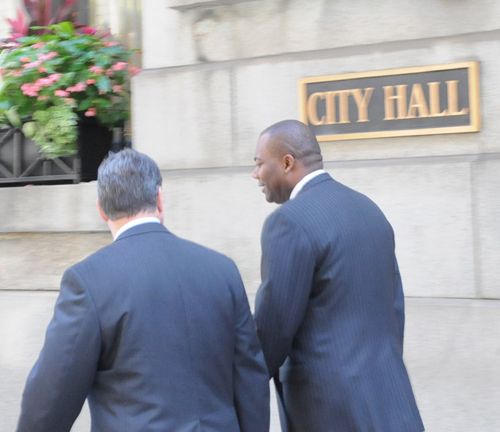 Chicago Public Schools Chief Executive Officer Jean-Claude Brizard has yet to hold a press conference where he answers reporters' questions without being under the watchful eye of Rahm Emanuel. On September 8, 2011, Brizard rushed out of City Hall before the City Council meeting had ended. Substance photo by George N. Schmidt.Chicago Public Schools officials are now referring to the schools that vote for the union contract waiver as the "Pioneers." CPS CEO Jean Claude Brizard, however, is still refusing to hold a press conference that isn't managed by Rahm Emanuel's media team.
Chicago Public Schools Chief Executive Officer Jean-Claude Brizard has yet to hold a press conference where he answers reporters' questions without being under the watchful eye of Rahm Emanuel. On September 8, 2011, Brizard rushed out of City Hall before the City Council meeting had ended. Substance photo by George N. Schmidt.Chicago Public Schools officials are now referring to the schools that vote for the union contract waiver as the "Pioneers." CPS CEO Jean Claude Brizard, however, is still refusing to hold a press conference that isn't managed by Rahm Emanuel's media team.
When the discussion of the longer school day resolution was over, Alderman Thomas told the Council that the resolution would be placed in the "omnibus." That meant there would not be an immediate roll call vote.
After all of the speeches proclaiming the importance of the longer school day, with a minority of those (most notably, Cardenas, Burke and Mell) attacking the Chicago Teachers Union, Rahm Emanuel told the aldermen he wanted them to follow Alderman Cochran's advice and go out to every school in their ward and tell the teachers and principals that Chicago wants the longer school day.

